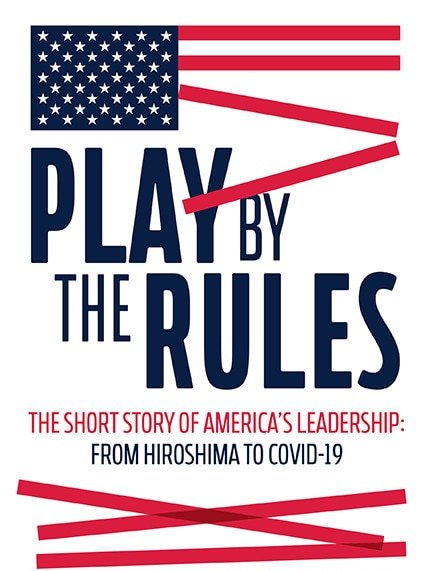Book shines a light on Trump and leadership throughout US history
Michael Pembroke’s new book, Play By The Rules, puts the President and his predecessors under the microscope
TWEET-freak President Donald Trump is an American creation. His spokespeople too, with their ‘‘alternative facts’’, are the progeny of the modern United States.
Others see through their braggadocio and believe that far from making America ‘‘great again’’, it is hastening the nation’s decline.
Wiser Americans criticise the shortcomings of their society and government more openly than most elsewhere do about their own countries, even those whose laws protect free expression.
The articulate frankness of such well-informed US citizens, and their courteous and generous hospitality, are admirable American attributes that enrich Michael Pembroke’s new book, Play By The Rules.
The US imperium, nascent from the late 1800s, rose rapidly from the radioactive ashes of Hiroshima. In the 21st-century, it is declining almost as fast. This is what Pembroke, a NSW Supreme Court judge turned writer in early retirement, heard from lots of knowledgeable Americans.
On a research residency at Princeton in 2017, he asked them: has the US made the world safer or better, is it a force for good, and is American leadership the best option for the 21st-first century?
Most said no.
Some pointed out that the difference between the US and past imperial powers is that America is still the world’s militarily strongest nation by far. A failing but well-armed hegemon is capable of doing a lot of damage, particularly if its leaders are proto-fascists.
Hope that Trump’s distaste for loss-making foreign wars is genuine and that his provocations of China and Iran are merely election stunts, is hardly a guarantee against disaster. At vast cost, US dominance and military ‘‘overmatch’’ threatens the opposite: the loss of global leadership.
America’s ‘‘imperial hubris’’ (as former CIA intelligence officer Michael Scheuer named it in 2004) disregards the very rules the US led the world in creating, and soon abandoned: the UN Charter, the Declaration of Human Rights, the Nuremberg principles, the international courts, and more.
The US military and the CIA were the twin offspring of the Cold War. The Pentagon became a highly visible monster, insatiably feeding on successive wars, while the CIA operated invisibly and unaccountably, undermining one government after another, and displacing leaders, including by assassination.

In peacetime, they both behaved as if America was always at war, as indeed it has been for the past four decades. Yet since 1945, the US can claim no success in any significant conflict.
The second half of what Time magazine writer Henry Luce in 1941 called the ‘‘American century’’ remains unrealised. Instead, American leaders urge others to conform to rules they made but don’t observe.
Pembroke quotes one reputable American saying that the US has lost the inspiration and international moral authority that were once a source of pride. Another disputes that it is – if it ever was – the task of the US to ‘‘lead, save, liberate, and ultimately transform this world’’.
Step by misguided step, from America’s unjustified atom bombing of Japan, followed by its fixation on defeating Soviet and Chinese communism in Korea and Vietnam, then fighting the ‘‘war on terror’’, and now its antagonistic mismanagement of the pandemic, the US has repeatedly tried to remake the world in its own image. It fails by setting the wrong example.
Even before Trump’s declaration of ‘‘America First’’, the US was becoming a leader which, Americans warned, ‘‘nobody follows and few respect, and a nation drifting dangerously amid a global chaos it cannot control’’.
Pembroke identifies US exceptionalism as the historical source of this drift, and traces it from the 1945 victory to the 2003 invasion of Iraq. He cites prominent Americans whose warnings for decades failed to divert the US from its march of folly. Instead, America’s routine response to foreign problems was armed force, sanctions and devastation. Now the US culture of militarism is being applied to domestic problems too.
Trump dislikes treaties, so its partners should beware. In other countries, leaders are no longer interested in transforming their countries according to America’s wishes.
Pembroke accepts Kishore Mahbubani’s argument that this century is Asia’s, and that it is passing America by.
Modern Asians, particularly Chinese, are building bridges, ports, roads, rail lines, pipelines and financial systems that offer unprecedented opportunities for economic prosperity, and are doing so peacefully.
The US, Pembroke reminds us, has 800 military bases around the world. China has one. The US has fought wars in 60 countries since 1980. China, apart from an offshore encounter with Vietnam in 1988, has fought none.
China is certainly no longer a developing country.
It should be in the G8, and it demands more respect for its interests. But it has won international influence through such peaceful initiatives as the Asian Infrastructure Investment Bank, the Shanghai Cooperation Organisation and the Belt and Road Initiative, none of which includes the US.
Clear, eloquent, meticulously referenced, and forensically argued as you might expect of a lawyer’s book, Play By The Rules concentrates on its chosen US subject.
But America plays by its own rules, no one else’s.
That opens the question of who Pembroke’s title is addressed to. Perhaps Australia? Instead of observing the rules-based order and joining the Asian century, Australia risks following the US down a lawless, disastrous, dark tunnel.
If ever there was a time when Australia urgently needed more diplomacy, more international co-operation, less militarism and no conflict, it is now.
Alison Broinowski is a former Australian diplomat.



To join the conversation, please log in. Don't have an account? Register
Join the conversation, you are commenting as Logout